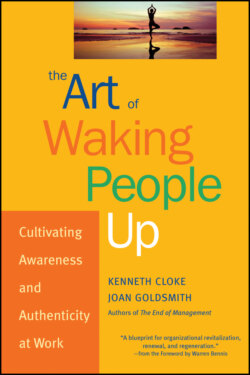Читать книгу The Art of Waking People Up - Kenneth Cloke - Страница 43
Some Underlying Questions
ОглавлениеEven in organizations whose cultures, values, and norms of behavior support democracy and encourage participation, it is not possible to wake up or act with awareness, authenticity, congruence, and commitment without consequences. These consequences force us to recognize and respond to several underlying questions: How eager are we to increase our awareness and engagement at work? How prepared are we to act authentically and shift our attitude and behavior? How willing are we to make our actions congruent with our values? How ready are we to take risks and become responsible for what we create?
In considering these questions, we are forced to address their neglected opposites: Are we willing to live our lives without ever waking up? Are we willing to spend our work lives being who others want us to be and surrendering our right to live and work as we choose?
Clearly, the path to waking up requires us to overcome numerous hurdles—visible and invisible, harmless and perilous. Awareness and authenticity can appear frightening, especially when the rewards seem minimal, the penalties high, the path unfamiliar, and the outcomes uncertain. For this reason, most employees choose security over self-actualization and are frightened and hostile toward those who take a different path.
Though there are clearly risks involved in waking up and living authentically, there are far greater risks in failing to do so, including the risk of losing what is most important in life—our unique characters, our capacity for awareness, and our ability to engage in collaborative relationships with others. This deeper risk led the German writer Goethe to warn, “The dangers in life are infinite, and among them is safety” (emphasis added).
This suggests another set of underlying questions: What would it mean to be awake, aware, authentic, congruent, and committed every day at work? What would we do differently? What organizational cultures, structures, systems, processes, and techniques would we change? How would we go about changing them? How would we treat those with whom we disagree? How would we approach each task? How would our attitudes change? Who would we become as a result? These questions lead in turn to our two final questions: Why wait? And why not start now?
